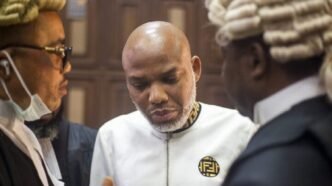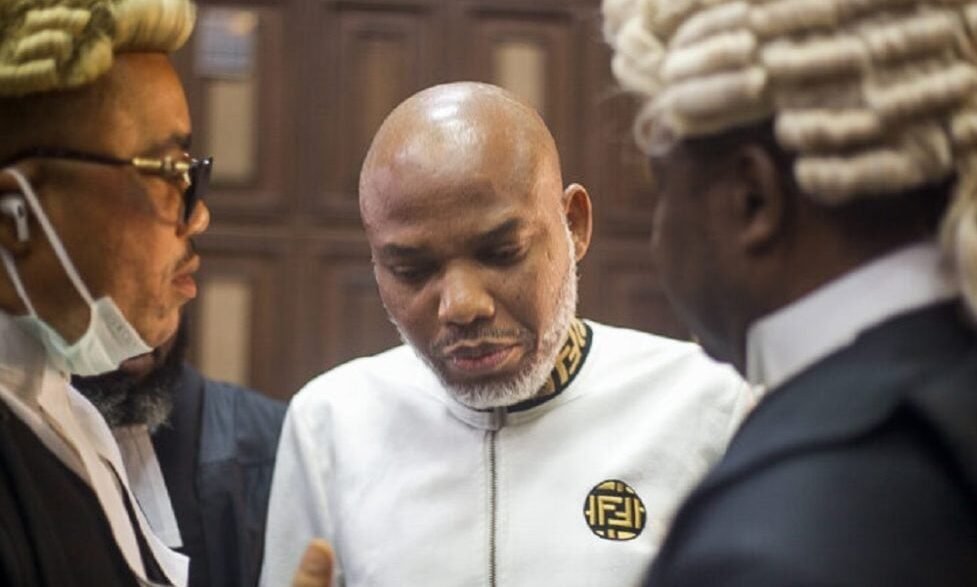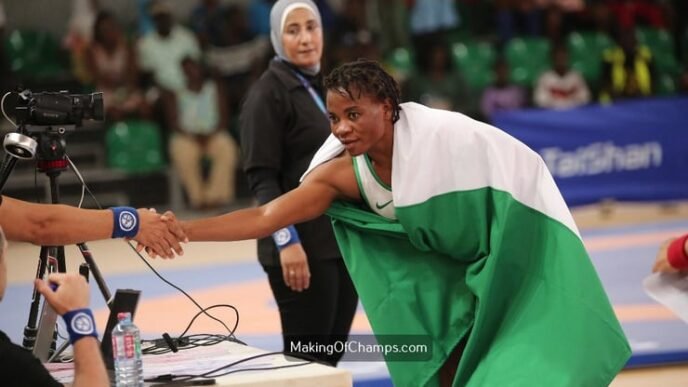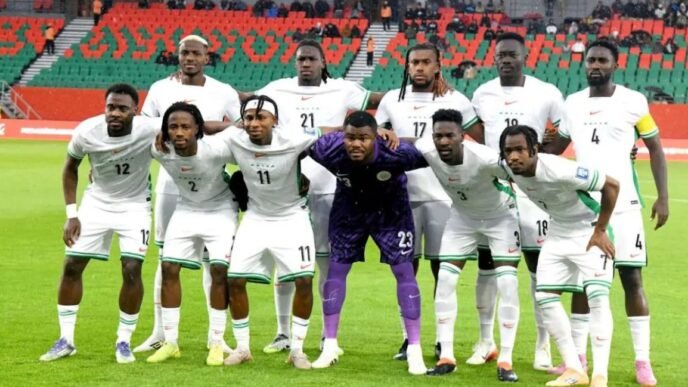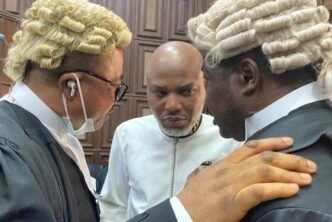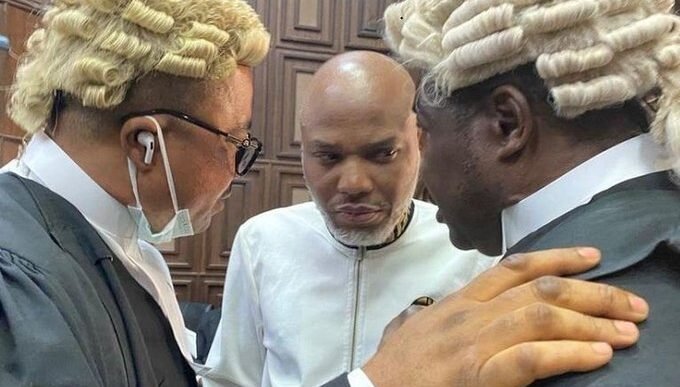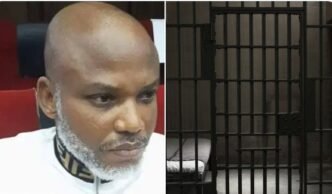Abuja, Nigeria — The Federal High Court in Abuja was thrown into tension on Thursday after Justice James Omotosho ordered security officials to remove Nnamdi Kanu, the leader of the Indigenous People of Biafra (IPOB), from the courtroom for what he described as “unruly conduct.” The dramatic scene unfolded just moments before the judge was set to deliver judgment in Kanu’s high-profile terrorism trial.
A Heated Morning in Court
The day began as a routine hearing, but the atmosphere quickly changed. Earlier in the session, Justice Omotosho dismissed three fresh applications submitted by Kanu’s legal team, describing them as lacking merit and raising issues that had already been dealt with in earlier proceedings.
As the court prepared to move into the final ruling, Kanu stood from the dock and interrupted the proceedings. He told the court that he could not be bound by any judgment because he had not yet filed his final written address, insisting that this document was critical to his defense. In a firm and raised voice, Kanu accused the court of bias and declared that the presiding judge “did not understand the law.”
The courtroom fell into disorder as the confrontation escalated. Justice Omotosho paused the proceedings, summoned security personnel, and ordered that Kanu be escorted out of the courtroom. The IPOB leader resisted verbally as officers moved in, but he was eventually led out to the shock and murmurs of observers.
The judge then announced that the court would proceed with delivering its judgment even in Kanu’s absence.
A Rare Decision in a High-Stakes Case
The removal of a defendant from the courtroom during a judgment session is highly unusual, and for a case as politically charged as Kanu’s, it underscores the court’s determination to conclude the matter without further disruption.
Justice Omotosho later remarked that Kanu’s disorderly behavior was not new and that the court would no longer allow proceedings to be repeatedly stalled by interruptions. He noted that the continued disruptions had become incompatible with the administration of justice.
As he was being escorted out, Kanu did not remain silent. He shouted that any judgment passed without his final address would be invalid and referred to the court’s actions as a “travesty,” positioning his removal as further evidence of what he and his supporters describe as judicial persecution.
Why This Judgment Day Was Pivotal
November 20, 2025, had been set as the day for delivering judgment after Kanu failed to open his defense within the six days granted by the court. Justice Omotosho had ruled that the IPOB leader had exhausted his opportunities to submit materials and call witnesses, effectively closing the defense phase of the trial.
Kanu, however, has consistently challenged the legal framework of the case. In an earlier motion, he argued that the terrorism statute under which he is being tried has been repealed and that continuing proceedings based on a law he considers invalid violates his constitutional rights.
His lawyers also argued that delivering judgment without resolving these legal objections would amount to denying him a fair hearing. They insisted that their client could not be required to defend charges that they believe no longer exist under Nigerian law.
The Court’s Position: Enough Delays
Justice Omotosho strongly disagreed with the defense. In dismissing Kanu’s latest applications, the judge stated that they merely repeated arguments previously considered and rejected. He stressed that under the Administration of Criminal Justice Act, ongoing criminal trials cannot be paused simply because a defendant files a new motion.
On the issue of bail and other procedural requests, the court ruled that the time had come to conclude the case and that any further concerns could be addressed in the final judgment. The judge signaled that some of the issues raised by Kanu would be treated within the ruling itself, making a separate pause unnecessary.
Kanu’s Strategy: Law or Politics?
Kanu’s approach has drawn attention not just for legal reasons, but for its political symbolism. Rather than participating in a conventional defense by calling witnesses and submitting testimonies, he has taken a stand that challenges the legitimacy of the charges and the trial itself.
To Kanu and many of his supporters, the case is not just a criminal trial—it is a political battle for recognition and self-determination. His defiant words as he was removed from court highlighted this stance. He appeared determined to make the moment a statement: that he rejects the authority of the court to try him under what he believes is an invalid framework.
This approach has fueled both support and criticism. His loyal followers see it as proof of his conviction and courage. Critics argue that it is a deliberate strategy to obstruct proceedings and delay justice.
The Bigger Story: Politics Meets the Courtroom
Nnamdi Kanu’s trial has always been more than a legal matter. As the leader of IPOB, his fate carries major political implications in the South-East. To supporters, he remains a hero of regional self-determination. To the federal government, he represents a threat to national unity.
Thursday’s courtroom incident highlights the longstanding tension between federal authority and separatist sentiment in the region. A ruling against Kanu could weaken his political capacity and limit his public influence. But if his supporters perceive the judgment as unfair or silencing, it could also intensify grievances across the South-East.
Many civil society groups, regional observers, and international analysts are watching the outcome closely. The trial has become a test of how Nigeria balances security concerns with constitutional rights in high-profile political cases.
What Happens Next?
With Kanu removed from the courtroom, several scenarios are now likely:
1. An Immediate Appeal
Kanu’s lawyers are almost certain to challenge any negative ruling. Their appeal could focus on jurisdiction, the validity of the terrorism charges, and their claim that Kanu was denied the opportunity to complete his defense.
2. Public Reaction
Supporters of IPOB are expected to respond. Past events suggest possible protests, public statements, and increased political pressure from groups who believe Kanu has been denied justice.
3. Security Measures
Authorities may step up police and military presence in the South-East to prevent potential unrest following the judgment. The federal government will be watching the region closely for signs of agitation.
4. Legal Precedent
The court’s decision to eject a defendant mid-proceeding and deliver a judgment in their absence may serve as an important reference point for future politically sensitive trials.
5. International Scrutiny
Human rights groups and legal monitors may question whether the defendant received a fair hearing, particularly after his removal from the courtroom.
A Turning Point in a Long Legal Battle
Thursday’s events mark a significant moment in a trial that has spanned years, crossed multiple legal disputes, and stirred intense emotion across Nigeria. The courtroom confrontation showed a collision between legal authority and political resistance. The judge sent a message that court proceedings must proceed without disruption. Kanu, in turn, sent his own message: that he refuses to recognize the legitimacy of the trial unless his constitutional challenges are addressed.
The coming days will reveal how this clash shapes the next phase of the IPOB leader’s legal and political journey. For now, the judgment—its contents, its fallout, and its reception—remains the focal point of national attention.

